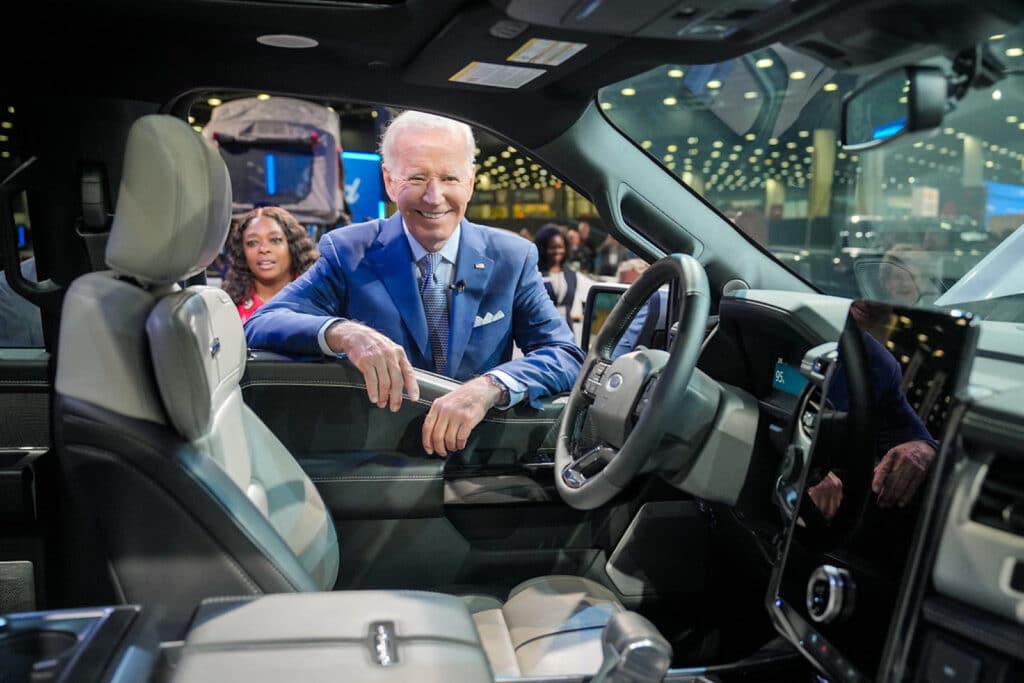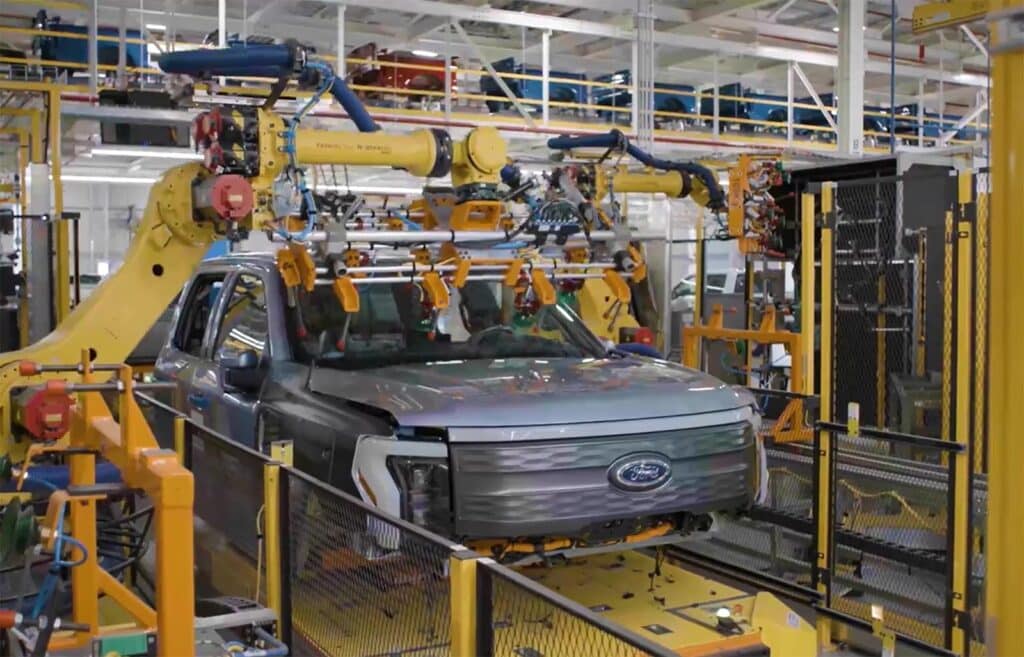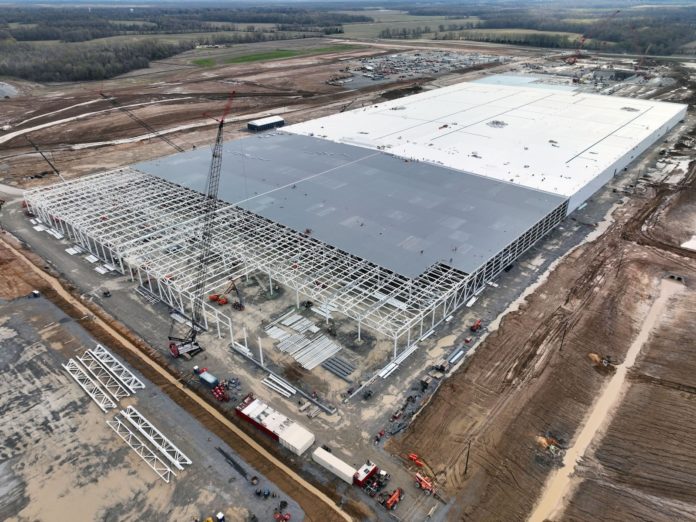The last time the United Auto Workers went on strike against the Ford Motor Co. Gerald Ford occupied the White House.
But automaker’s new BlueOval City electric vehicle project has come under fire from UAW President Shawn Fain, who is criticizing the Biden administration plans to loan the automaker and its partner, South Korea’s SK On $9.2 billion for new battery plants in Kentucky and Tennessee for failing to ensure active participation by organized labor.
The U.S. Department of Energy’s (DOE) Loan Programs Office announced a conditional commitment for a loan of up to $9.2 billion to BlueOval SK LLC for the construction of three manufacturing plants to produce batteries for the company’s future Ford and Lincoln electric vehicles.
DOE did not list any conditions
The specific conditions were not listed by DOE, but Fain did not hesitate to criticize DOE and the Biden administration for falling short on their rhetorical commitments to the UAW and other unions.
“Yesterday, the federal government announced a massive $9.2 billion giveaway loan to Ford Motor Co. through the Department of Energy to create 7,500 low-road jobs with no consideration for wages, working conditions, union rights or retirement security. This handout may further enrich Ford shareholders, but it shortchanges communities and the UAW members who produce Ford’s vehicles, powertrains and record-breaking profits,” said Fain in a statement released after the DOE decision became public.
“We have been absolutely clear that the switch to electric engine jobs, battery production and other EV manufacturing cannot become a race to the bottom. Not only is the federal government not using its power to turn the tide — they’re actively funding the race to the bottom with billions in public money,” added Fain.

In April, Fain announced the UAW would withhold an endorsement of Biden’s re-election bid because he wanted to see the administration take additional steps to ensure battery-plant jobs were well paid and unionized.
“These companies are extremely profitable and will continue to make money hand over fist whether they’re selling combustion engines or EVs. Yet the workers get a smaller and smaller piece of the pie. Why is Joe Biden’s administration facilitating this corporate greed with taxpayer money?” Fain added.
Over the years, Ford, led by Executive Chairman Bill Ford, has taken steps to build a good relationship with the UAW, which has not struck the company since 1976 when Gerald Ford was president. The company’s executives note Ford now employs more UAW members than any other corporation in the U.S.
But Bernie Ricke, the longtime President of UAW Local 600, which represents workers at the company’s sprawling Rouge complex, noted in a recent interview the UAW with its concessions helped the company avoid bankruptcy during the Great Recession. A bankruptcy would have jeopardized the Ford family’s stake in the company.
UAW wary of Ford plans
However, the Ford electrification project, as designed by CEO Jim Farley, has raised concerns with union officials.
Fain became UAW President in March after emerging as the winner by a meager 400 votes during two rounds of voting by UAW members. As part of his campaign against incumbent Ray Curry he said union officials were failing to ensure the UAW would have a foothold inside BlueOval.

Since becoming UAW president, Fain also has said up until now the UAW has been left behind in the industry’s move towards electrification.
Ford’s official comment did little to ease UAW concerns.
“Ford expects that BlueOval SK will pay competitive wages and benefits to attract and retain the workforce needed to build high-tech batteries. Employees at BlueOval SK’s battery plants will be able to choose whether they organize, a right that Ford fully respects and supports, Ford said in a statement in response to Fain.
John Murphy, the lead automotive analyst for Bank of America, noted during an appearance at the APA, noted industry executives are still trying to adjust to the new UAW president as well as his demands and militant rhetoric. “Shawn Fain is a wild card,” said Murphy, adding he is 90% certain there will be a strike at Stellantis and said the changes of strike at GM and Ford are 50-50.
For his part, Fain continues to push his argument that union members made sacrifices and it is now time for Detroit’s immensely profitably automakers to pay up.
Union sacrifices cited
“The last time the federal government gave the Big Three billions of dollars, the companies did the exact same thing: slash wages, cut jobs, and undermine the industry that for generations created the best jobs for working families in this country. Autoworkers and our families took the hit in 2009 in the name of saving the industry. We were never made whole, and it’s an absolute shame to see another Democratic administration doubling down on a taxpayer-funded corporate giveaway.”

“In the past five years, workers who build GM products in Lordstown, Ohio, have had their lives turned upside down as they were forced to retire, quit or uproot their families and move all over the United States when GM closed their plants despite massive profits.
“Their jobs were replaced in GM’s new joint-venture battery facility with jobs that pay half of what workers made at the previous Lordstown plant. Not only is the White House refusing to right this wrong, they’re giving Ford $9.2 billion to create the same low-road jobs in Kentucky and Tennessee.”
The DOE said the grant will enable more than 120 gigawatt hours of U.S. battery production annually and displace more than 455 million gallons of gasoline per year for the lifetime of the vehicles powered by these batteries.
The project is expected to create a total of approximately 5,000 constructions jobs in Tennessee and Kentucky, and 7,500 operations jobs once the plants are up and running.
Investing at home
This effort supports President Biden’s “Investing in America” agenda to onshore and re-shore domestic manufacturing of technologies that are critical to reaching the clean energy and transportation future.
Expanding domestic production of American-made batteries is critical to reaching the Biden-Harris Administration’s goals to have EVs represent at least 50% of all new car sales in the U.S. by 2030, reach net-zero electricity by 2035 and a net-zero economy by 2050.
BOSK, which was created to supply Ford with batteries for its growing EV product line, is actively engaging with local stakeholders to develop a diverse local workforce and network of suppliers.
To ensure the availability of skilled labor for construction, BOSK is constructing the projects under project labor agreements. In addition, LPO works with all borrowers to create good-paying jobs with strong labor standards during construction, operations, and throughout the life of the loan and to adhere to a strong Community Benefits Plan, DOE said.
The project also supports Biden’s “Justice40 Initiative,” which established the goal that 40% of overall benefits of certain federal investments, including LPO financing, go to DOE-identified disadvantaged communities.

